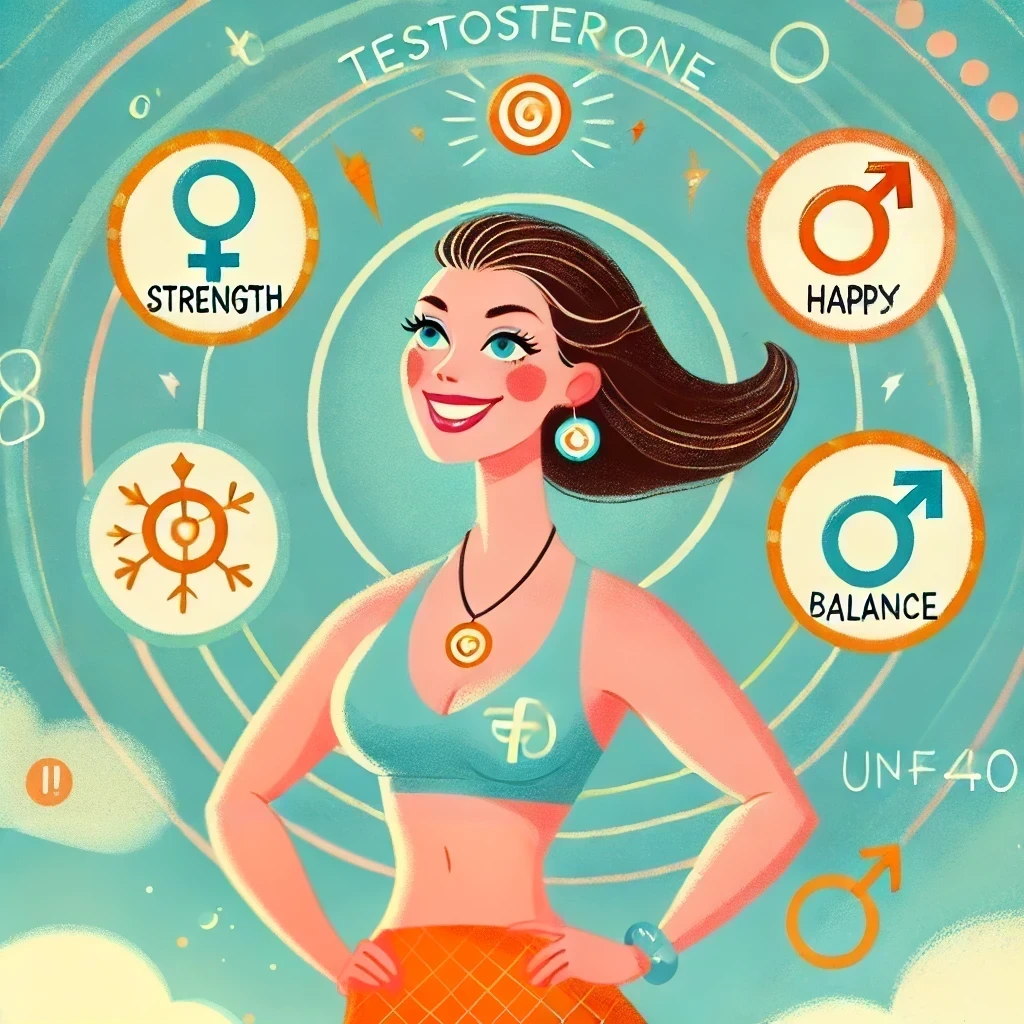
Let’s Talk Testosterone: My Not-So-Secret Superpower
I’ll say it right now: Testosterone is the unsung hero in my hormone line-up, the Most Valuable Player that has single-handedly kept me from collapsing next to the washing machine (or under the weight of a blow dryer). Whether you’re in peri-menopause, surgical menopause like me, or just naturally going through the hormone shuffle, testosterone might just be the superhero sidekick you never knew you needed. And if you’re plain deficient? Well, we’ve got to talk.
The Clues That You’re Low on Testosterone (aka “Why Am I So Weak and Grumpy?”)
For me, the signs were obvious—and ridiculous. Let me paint a picture: one moment I’m valiantly trying to pull laundry out of the machine, and the next, I’m lying on my back on the laundry room floor like I’ve just run a marathon. Changing the bedsheets became an Olympic-level event, complete with huffing, puffing, and lots of lying down for “strategic pauses.” Even holding up my hair dryer felt like lifting weights. Every muscle just checked out, like, “Nope, not today.”
And then there’s the mood. Testosterone isn’t just a muscle-booster—it’s a mood booster. Without it, I found myself irritated by the smallest things: crooked picture frames, slow walkers, my own reflection first thing in the morning. Not to mention, any motivation I had to tackle my day suddenly took an extended vacation.
Here’s a rundown of what low testosterone can look like:
- Weakness or loss of muscle strength (the laundry pile becomes Everest)
- Low energy and constant fatigue (coffee doesn’t even help)
- Mood swings and irritability (tiny things feel ENORMOUSLY annoying)
- Decreased libido (we’ll get to this in a minute, trust me)
- Struggling with motivation (even the thought of getting off the couch feels hard)
So if any of this sounds familiar, grab a cup of tea (or something stronger) because it might be time to talk testosterone.
The Science Bit: What Testosterone Actually Does
Well, yes, it’s famously tied to libido. Think of it as your body’s “enthusiasm hormone.” It can influence how interested you are in sex, and even how much enjoyment you get from it. But testosterone is no one-trick pony; it’s working all over your body, in ways you probably didn’t even realize.
The All-Access Hormone: Testosterone’s Full Body VIP Pass
Let’s start with this: you’ve got testosterone receptors sprinkled across your entire body. This means it’s not just hanging out in the “libido department”—it’s making itself useful everywhere. Think of testosterone as the behind-the-scenes VIP who has access to all the lounges.
Testosterone and the Brain: Your In-House Focus Boost and Mood Lifter
Ever notice how sometimes your mind is sharp, and other times it’s like running a marathon through oatmeal? Testosterone plays a big role in that. It strengthens the connections in your brain, which means more mental clarity and focus. Imagine someone turning up the volume on your mental sharpness—things feel a bit brighter, thoughts come a little faster.
Then there’s the blood flow. Testosterone helps keep those brain arteries strong and healthy, ensuring a good flow of oxygen and nutrients. Good blood flow is not just about keeping your ticker happy; it’s essential for brain health, too, and may even help fend off memory issues.
And here’s where it really gets interesting: testosterone also does a little serotonin magic. It helps regulate serotonin—the “I feel good” neurotransmitter that keeps your mood up. Ever feel randomly irritated by, say, someone chewing too loudly, or a drawer that just won’t close? Low testosterone could be making that worse by messing with your serotonin levels. And if serotonin is the calm, grounded friend in your brain, dopamine is the party animal—responsible for motivation, pleasure, and reward. Testosterone gives your dopamine a little boost too, helping you feel motivated and engaged with life. So yes, testosterone helps keep you from turning into a grumpy, unmotivated mess.
Muscles, Bones, and All That Jazz
If testosterone could wear a “personal trainer” hat, it would. This hormone is crucial for muscle mass and bone strength. Ever felt weak after trying to lift something you used to handle easily? Testosterone’s got your back (and your biceps). It’s helping your body maintain muscle, which keeps you stronger longer.
And bones? Not just for show. Testosterone works to keep your bones dense and strong, which is especially important as we age. It’s like having an invisible bodyguard against fractures.
The Energiser: Cardio, Sleep, and Stamina
Testosterone also lends a hand (or a hormone) in your cardiovascular health. Stronger heart, better circulation, more energy. Plus, when your testosterone levels are right, it’s easier to stay active without feeling totally wiped out. Even sleep quality can improve; better testosterone levels can help you wake up feeling genuinely rested—not just like you went ten rounds with your duvet.
So, testosterone is much more than a libido booster. It’s your body’s internal motivator, memory-keeper, and strength coach—all wrapped up in one.
Testosterone isn’t just some “male hormone”—it’s in all of us, and it plays a huge role in our health and well-being. In fact, it works on the brain and body in fascinating ways.
1. Boosts Muscle Strength and Energy
Testosterone fuels our muscles. It’s essential for muscle maintenance, endurance, and overall strength. When levels drop, so does your muscle power, which explains why laundry day or changing the sheets suddenly feels like extreme sports.
2. Improves Mood and Motivation
Testosterone is a motivator, a mood-lifter, and, quite honestly, a lifesaver. It directly impacts neurotransmitters in our brains, like dopamine, which is associated with pleasure and motivation. When testosterone levels are balanced, life just feels a little brighter, like everything has an extra sparkle (even if you’re just doing the dishes). But without it? Let’s just say there’s a reason I started snapping at inanimate objects.
3. Keeps Libido Alive
Yep, here’s where things get spicy. Testosterone is linked to sex drive and overall interest in intimacy. If you find yourself less interested (or completely uninterested), testosterone might be playing a part. It’s not just about libido—it’s about feeling connected, in tune with yourself, and a little more confident.
For a deep dive into testosterone’s impact on women’s health, check out this research from the North American Menopause Society. They’ve been looking at testosterone therapy and the huge difference it can make in post-menopausal women.
How Testosterone Saved My Sanity
I have to tell you, the mood improvement alone is worth the whole testosterone regimen. Once I started, it was like the clouds lifted. I felt more optimistic, more motivated, and—here’s the kicker—way less bothered by the little things. It turns out testosterone doesn’t just give you muscle; it gives you emotional muscle.
Suddenly, the mountain of dishes in the sink didn’t feel like a personal attack on my sanity. I wasn’t nearly as ready to throw my hair dryer out the window after 30 seconds of arm fatigue. Testosterone’s impact on my mood was real, and let me tell you, my friends and family were thrilled. I was no longer the grumpy, irritated version of myself.
Plus, I found myself re-discovering hobbies I’d given up on because I just didn’t have the energy or enthusiasm for them. Whether it was gardening, cooking, or just staying awake past 9 pm, testosterone brought back the zest I hadn’t realized I was missing.
Let’s Talk Libido
Alright, ladies, let’s not tiptoe around it. Libido matters, and testosterone plays a huge role. Pre-testosterone, I was in survival mode. “Intimacy” felt like an item on my to-do list, and not the kind I was looking forward to. But when my testosterone levels improved, so did my libido. Suddenly, I was actually interested, invested, and, dare I say it, excited. It wasn’t just about physical drive, either—it was about feeling good in my own skin, feeling connected to myself and my partner again.
If you’ve been feeling like the romantic spark just isn’t there anymore, trust me, testosterone might be worth exploring. And it’s not all about sex—this boost in libido can also make you feel more alive, more passionate, and more connected to life itself.
